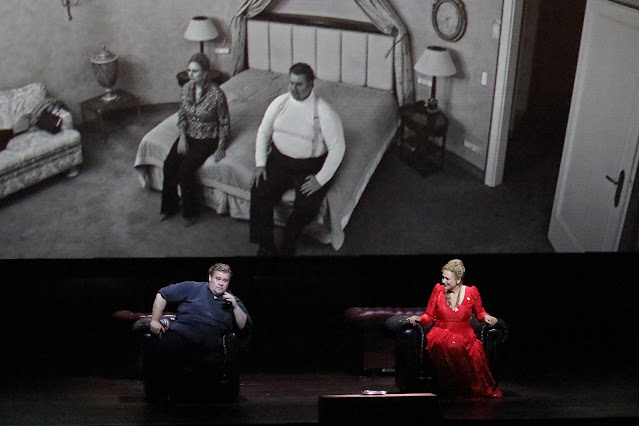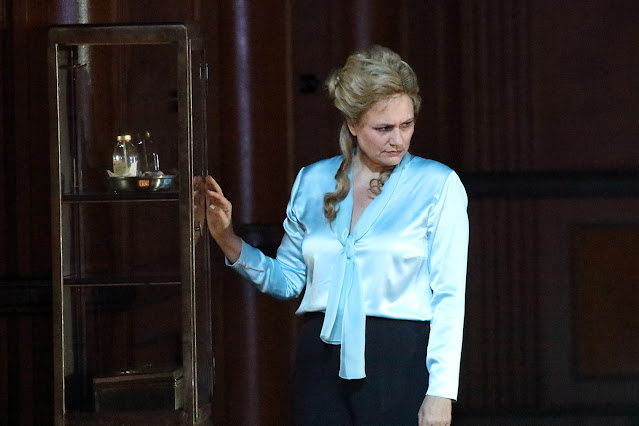Philharmonie
Chamber Symphony no.1 in E major, op.9
Die Jakobsleiter
Gabriel – Wolfgang Koch
One who is called – Daniel Behle
One who protests – Wolfgang Ablinger-Sperrhacke
One who struggles – Johannes Martin Kränzle
The chosen one – Gyula Orendt
The monk – Stephan Rügamer
The dying one – Nicola Beller Carbone
The soul – Liv Redpath, Jasmin Delfs
Berlin Radio Chorus (chorus director: Gijs Leenaars)
 |
| Image: © Stephan Rabold |
150 years on from the birth of Arnold Schoenberg, we could be forgiven for lamenting this world still does not know what to do with him and his music. The most important of twentieth-century composers, he languishes respected yet for the most part unperformed. The muted tones in which even this, his anniversary year, is being celebrated – if not now, then when? – are such that it could readily be missed altogether. There are exceptions, not least my friends and colleagues at Vienna’s Arnold Schönberg Center; I am referring essentially to the world of musical performance—and listening. And just perhaps here also in Berlin, second of Schoenberg’s three major cities. (Los Angeles, alas, has long seemed a lost cause.) Not so much in the city as a whole: we search in vain for contributions from its opera houses – surely things would have been different, were Daniel Barenboim still at the helm of the Staatsoper – and indeed from most of its orchestras, yet in the Philharmonie, home to the Berlin Philharmonic, we at least see in the foyer a little exhibition, mounted in conjunction with the ASC, and here we have now also heard the first of several contributions planned from the orchestra.
If they continue even to approach the level of this instalment, all will not be lost. The First Chamber Symphony offered a splendid way to start. It was the first live Schoenberg I heard, travelling down as a schoolboy to London on the coach from Sheffield for my first Prom; I think it was actually the first piece on the programme, so the first notes I heard at the Proms, at the Royal Albert Hall, indeed in London, were Schoenberg’s. An attempt at comparison would be pointless: I cannot remember much other than that, even then, it impressed me greatly. But this is therefore a work with which I have lived for a while, and of which I have heard a number of fine performances since that CBSO Prom with Simon Rattle (and Maurizio Pollini), one next door at the Kammermusiksaal included (from members of this same orchestra as the Scharoun Ensemble and Pierre Boulez). Today’s Berlin Philharmonic and Kirill Petrenko have little to fear from even the most exalted comparisons, but it is better simply to consider their performance on its own terms.
In some ways the most conservative – in the proper rather than the debased, contemporary sense – of revolutionaries and surely the most revolutionary of conservatives, Schoenberg stands Janus-faced, that historical position readily conveyed here in immanent, performing terms. For a work so sunny and life-affirming, it is haunted by ghosts, many of whom cheerfully partook of this particular feast. First up, in the opening bars, was Richard Strauss, already balanced by a heightened sense that this was as much chamber music, a gathering of soloists, as symphony (or indeed symphonic poem). Brahmsian developing variation, Wagnerian melos, passage of transition that owed much to both, and of course Lisztian formal inheritance were to the fore, but through the particular material and character of this piece; it never felt like anything other than itself, though there was to be heard something of a more traditional, darkly ‘German’ sound and warmth to the ensemble than might often have been the case from Petrenko’s two immediate predecessors, Claudio Abbado and Simon Rattle, albeit without sacrifice to clarity and balance. So assured was the latter that one might almost have forgotten what an astonishingly difficult feat it is to bring off (as Herbert von Karajan, Abbado’s predecessor, freely admitted). Illuminating detail – sepulchral, Alberich-like playing from violist Diyang Mei, a snatch of Pierrot-laughter from Kilian Herold’s clarinet – was present to an extent sometimes difficult to believe, but always within a sure and malleable sense of the whole. The development truly developed, showing Schoenberg as heir to Beethovenian struggle. The ‘lightness’ of the beginning of the ‘slow movement’ offered a surprising presentiment of the ‘air of another planet’ soon to be experienced in Schoenberg’s Second String Quartet, prior to well-nigh Mahlerian ‘deepening’. No performance of this complex piece can be perfect; it contains more than can ever be achieved in a single performance. This came closer than most.
True revelation, though, came with Die Jakobsleiter. So seldom is this extraordinary work heard that I cannot have been the only audience member hearing it live for the first time. I had thought I knew this incomplete oratorio well enough, yet such were the strength and all-round excellence of this performance that I realised I had hardly known it at all. Indeed, not the least of my realisations was that one cannot really begin to know it other than through live performance. Recordings, however excellent, can barely suggest the spatial dimension – here the hall came into its own as much as the performers – nor, more important still, the overwhelming power and conviction inherent in the work and any performance worthy of it. One felt the work’s constructivism from the off, its opening cello hexachord so clearly, powerfully generative of what ensued: musical expression first, words from Wolfgang Koch’s Gabriel next. ‘Whether right or left, forward or backward, uphill or downhill’: one felt, harmonically, motivically, conceptually the multi-dimensional Schoenbergian Idea. Just as important, its colours, not only orchestral (though the inheritance of the Five Orchestral Pieces, op.16 was thrillingly apparent) but vocal too, not least from the souls of the Berlin Radio Chorus, individual and as a mass. Instrumental lines, as if generated by the Chamber Symphony and further developed here, contributed equally to the composer’s hyper-expressivity and the sense of its absolute necessity. It was relentlessly dialectical, relentlessly communicative, already pointing to elements of the world of Moses und Aron. A well-nigh flawless cast of vocal soloists had been assembled and exceeded expectations. Again, the variety of colours and expressive gestures within a single performance, be it that of the increasingly Wagnerian Daniel Behle, the dark, rich Gyula Orendt, Liv Redpath and Jasmin Delfs’s souls in vocalise, or anyone else had to be heard to be believed. Schoenberg’s vivid imagery – or is that too representational a characterisation? – was brought still more vividly to life that was both fleeting and aspirant to the eternal.
All the while, we moved, after Swedenborg, upwards, heralded by the sweetest of violin solos from above, instruments and voices surrounding us as if truly from the heavens. This was less the air of another planet than of another dimension, music and post-Wagnerian, post-Mahlerian redemption above, beyond, around us. This was a magic unlike anything I had yet heard. Part of our world, then, does know what to do with Schoenberg and his music. May it serve as an example to the rest.

























